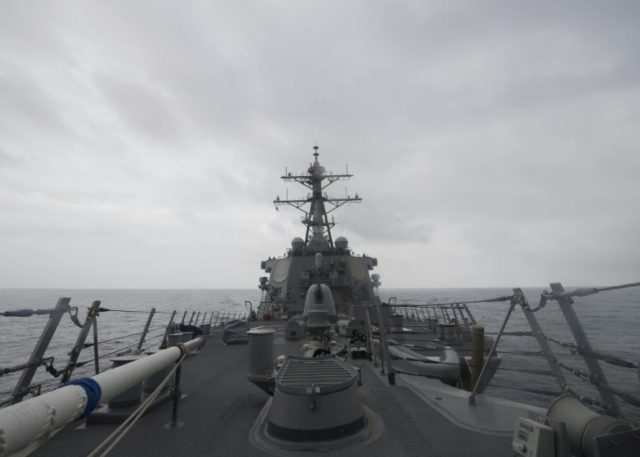Two American warships, the guided-missile destroyer USS Higgins and the missile cruiser USS Antietam, conducted a freedom of navigation patrol near Woody Island in the South China Sea on Sunday – the same island in the Paracels chain where China landed nuclear-capable long-range bombers for the first time last week.
U.S. officials said the two ships conducted operations within 12 nautical miles of four Paracel islands, including Tree, Lincoln, Triton, and Woody. The officials said the operation was planned months in advance, long before the decision was made last week to rescind China’s invitation to the multinational Rim of the Pacific (RIMPAC) exercise to protest its militarization of the South China Sea.
“U.S. forces operate in the Asia-Pacific region on a daily basis, including in the South China Sea. All operations are conducted in accordance with international law and demonstrate that the United States will fly, sail, and operate wherever international law allows,” the Pentagon said in a statement to Fox News.
Fox notes that not only has China used its airbase on Woody Island to land heavy bombers, but it has deployed an advanced surface-to-air missile system. Satellite images taken last week appear to show two new missile launchers and a radar system on the northern shore of the island, concealed by a camouflage net. The system is described as a potential threat to both civilian and military planes within 125 miles of the installation.
The Asia Maritime Transparency Initiative in Washington believes new weapon systems were dropped on Woody Island under the guise of “military exercises” in early May, citing satellite imagery that shows much of the equipment is still in place even though the exercises ended weeks ago.
China’s foreign and defense ministries both protested the “unauthorized” American freedom of navigation exercise. The Defense Ministry said that the Chinese military “took immediate action, deploying ships and aircraft to identify the U.S. vessels and issued warnings to drive them away.”
China’s People’s Daily summarized the responses:
The Ministry of Foreign Affairs slammed the US of trespassing in China’s territorial waters. In a statement released on Sunday, spokesperson Lu Kang said that the US warships entered Chinese territory without permission from the Chinese government, adding that the Chinese navy identified the US warships, warned them, and drove them away.
Lu stressed that Xisha Islands are China’s inherent territory, noting that the Chinese government, in accordance with the Law of the People’s Republic of China on the Territorial Sea and the Contiguous Zone, promulgated the baselines of the territorial sea adjacent to the Xisha Islands in 1996.
Lu called on the US to immediately stop such provocative operations that encroach upon China’s sovereignty and threaten China’s security, adding that China will to take all necessary measures to protect and defend the nation.
The Ministry of Defense also responded to the provocation. Spokesperson Wu Qian said in a statement that the US warships gravely violated Chinese sovereignty, undermined strategic mutual trust between the two militaries, and damaged peace, security, and good order in the waters.
Wu added that the Chinese military stands ready to protect and defend the nation and maintain regional peace and stability.
The operation also clearly angered many Chinese netizens, who took to the Internet to protest the provocation. “The US believes it should be the world’s policeman,” a Chinese netizen commented. “Perhaps we should send warships through their doorway to see what the reaction would be,” another commented.
China’s Xinhua news service fumed about the U.S. warships “trespassing” into Chinese territorial waters in violation of “Chinese and relevant international laws.”
Australia’s News.com notes that international law does not, in fact, support China’s claim of ownership over 80 percent of the South China Sea. Vietnam also has claims in the Paracels, while Taiwan, Malaysia, and Brunei have competing claims in other parts of the South China Sea. About $5 trillion in international shipping passes through the area every year.

COMMENTS
Please let us know if you're having issues with commenting.